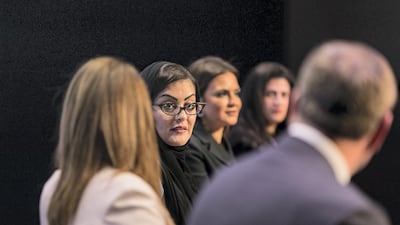It is often said that every story told in the history of humankind boils down to seven basic plots. The stories that have captivated us over the centuries are all versions of the same plotlines and recycled for new generations to enjoy. This holds true, whether it is an ancient Greek myth or the latest Hollywood film.
These plots, in essence, can be summarised as follows: overcoming the monster; rags to riches; the quest; voyage and return; rebirth; comedy; tragedy. Christopher Booker, a journalist who spent more than three decades studying works including Beowulf, Watership Down, Jaws and Terminator, crystallised this theory in his 2004 book The Seven Basic Plots: Why We Tell Stories, drawing parallels and analogies from each. His research serves to make the point that humans like a good story with a reassuring or familiar conclusion.
At the World Economic Forum in the Dead Sea region, Jordan, last weekend, two distinct narratives emerged.
The first was that the Middle East and North Africa is a region troubled by terrible conflict, a lack of opportunity for women, a youth bulge and religious extremism.
The second was that the region is also filled with young and talented entrepreneurs and innovators, poised to transform the place they live in, thanks to the power of technology and education.
The former narrative falls firmly in Booker's tragedy category. The latter has echoes of the rags to riches and quest tropes and includes the remarkably rapid growth of ride-hailing platform Careem, recently acquired by its larger American competitor Uber for $3.1 billion. More broadly, there are leading, oil-rich Gulf countries like the UAE, which in a matter of decades have transformed into modern, knowledge-driven economies – a firm validation of the rags to riches tale.
Across the Middle East and North Africa today, thousands of brilliant people are the protagonists of their own success story and encapsulate the quest trope as they embark on a journey to improve the world they live in. Many of them, like the top 100 Arab start-ups identified by the forum, will end up becoming financially successful. Of those that do not have a happy ending, however, that does not automatically mean tragedy.
However, the bigger truth is that we need to become much better at telling success stories.
The tragedy that plays out in the region is dark but compelling. The headlines across all forms of media about terrorism, authoritarianism or extremism create a crescendo that detracts from other narratives.
Crises across the region, from Syria’s millions of refugees and displaced people and Palestine’s oppressed masses to the threat of extremist ideology, are unlikely to come to a swift resolution.
As such, the narrative of war and terror in parts of the region will continue to be with us for a long time. That is an inevitable tragedy and an important story that needs to be told – but it cannot be the only one. We need to become more confident about telling other tales.
The only solution, then, to changing the one-tone narrative is to make sure those stories are told with as much colour as possible, including details of the challenges and the difficulties faced and the mistakes made along the way. For a story to be truly spellbinding, there has to be as much about the hardships endured as there is about the outcome.
The founders of Careem were former consultants from McKinsey and Company and understood how to tell their story to investors. That is part of their success and partly explains how they managed to raise $771 million from inside and outside the region in just six years, before they were bought by Uber, at a huge profit for their backers. The Careem story is interesting not just because of the windfall at the end but also because of the challenges its founders had to overcome to get there, including, at times, facing barriers to growth in several Middle Eastern markets. The end result is as much testament to the company's resilience and resourcefulness as its ultimate success because as any business owner will know, there will always be challenges and how they are handled is what counts.
And as any investor relations executive at a publicly listed company will tell you, crafting a compelling "equity story" is an important aspect of making a company’s shares worth buying. There is a link between the most valuable companies and the ones with the best stories. Just think of how the revival of the Apple brand was so intertwined with Steve Jobs's own story of success, then failure, then triumph over adversity. Or the number of inspiring stories you hear in the business world from successful company founders and chief executives. The common denominator is that they share their pain and suffering as well as their victory. They invite you to cheer them on as you hear what they went through.
There are stories unfolding in the Middle East and North Africa that are just as compelling as those told elsewhere. We just need to remember to tell the rest of the world to pull up a chair and listen.
Mustafa Alrawi is an assistant editor-in-chief at The National

